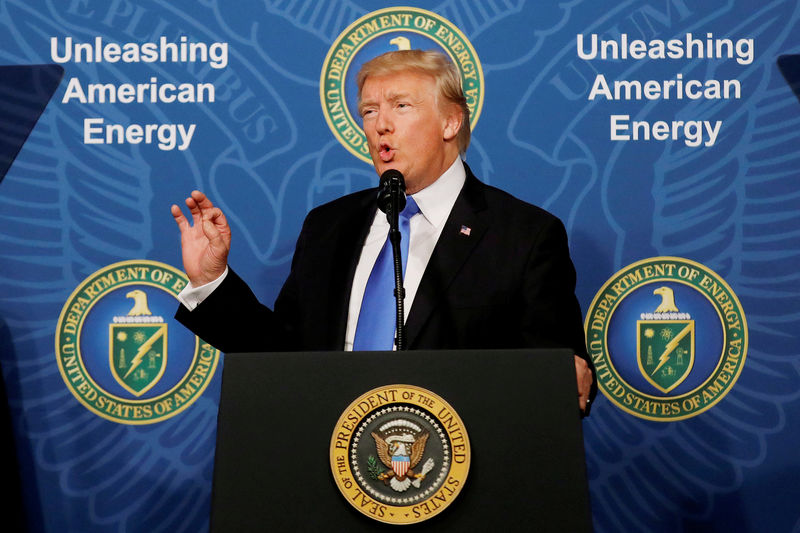 © Reuters. FILE PHOTO: U.S. President Donald Trump delivers remarks during an ‘Unleashing American Energy’ event at the Department of Energy in Washington
© Reuters. FILE PHOTO: U.S. President Donald Trump delivers remarks during an ‘Unleashing American Energy’ event at the Department of Energy in WashingtonBy Jarrett Renshaw
NEW YORK (Reuters) – U.S. President Donald Trump is expected to lay out his plans for the nation’s biofuel policy on Tuesday in a closed door briefing with senators, after months of hearing arguments about the hotly contested regulation, according to two sources.
The meeting could bring to an end a tumultuous several months of talks between Big Corn and Big Oil over the future of the U.S. Renewable Fuel Standard, discussions that were mediated by the White House and intended to help oil refiners cope with the costs of the regulation.
“The White House is saying this is the last meeting, so we are expecting some type of resolution or some plan going forward,” said one of the sources.
Republican Senators Chuck Grassley and Joni Ernst of major corn growing state Iowa will attend the meeting, along with Republican Senators Ted Cruz of Texas and Pat Toomey of Pennsylvania, whose constituents include big oil refining companies, the sources said on Monday, asking not to be named.
The RFS requires refining companies to mix increasing amounts of biofuels like corn-based ethanol into the nation’s fuel each year, or purchase credits from companies that do.
The policy is intended to help farmers and cut petroleum imports. But some merchant refiners, like PBF Energy (N:) and Valero Energy Corp (N:), say it costs them hundreds of millions of dollars annually.
The Trump administration waded into the issue late last year after fielding complaints from the refining sector, and hosted a series of meetings with lawmakers and company executives representing both sides.
But the talks ended in dispute, with both sides complaining that they were not getting what they wanted.
At one point, Trump threw his support behind a proposal from Cruz to cap compliance credits at 10 cents apiece – a fraction of the current level – to reduce refiner costs. But the administration backed off the idea after corn states said it would weaken the incentive to blend biofuels.
Trump had also said he supports the idea of expanding sales of higher ethanol blends of gasoline, a concession to the corn industry, but a drawback for the oil industry which complains it would reduce petroleum’s share of the fuel market.
The sources familiar with Tuesday’s meeting said they did not know what, if any, new ideas Trump might propose.
Both the corn lobby and the merchant refining industry say a misstep could threaten the same blue-collar jobs Trump has vowed to support. But pressure to rein in regulatory costs has also softened in recent weeks as the price of compliance credits have hit five-year lows of around 30 cents.
Those declines were driven mainly by news the Environmental Protection Agency had granted more than two dozen hardship exemptions from the RFS to small refineries that say compliance would have been too financially difficult.
In the past, the EPA has tended to give out less than ten such waivers annually, according to former officials.
The expansion of the small refinery waiver program is due in part to a federal court decision last year that said the EPA had been too stingy with the exemptions in the past. But biofuel groups say the EPA is using the cover of the court to gut the RFS.
Fusion Media or anyone involved with Fusion Media will not accept any liability for loss or damage as a result of reliance on the information including data, quotes, charts and buy/sell signals contained within this website. Please be fully informed regarding the risks and costs associated with trading the financial markets, it is one of the riskiest investment forms possible.
Source: Investing.com


























